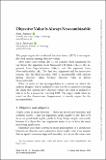| dc.contributor.author | Spencer, Jack | |
| dc.date.accessioned | 2021-03-17T13:55:01Z | |
| dc.date.available | 2021-03-17T13:55:01Z | |
| dc.date.issued | 2019-12 | |
| dc.date.submitted | 2019-10 | |
| dc.identifier.issn | 0026-4423 | |
| dc.identifier.uri | https://hdl.handle.net/1721.1/130152 | |
| dc.description.abstract | This paper argues that evidential decision theory is incompatible with options having objective values. If options have objective values, then it should always be rationally permissible for an agent to choose an option if they are certain that the option uniquely maximizes objective value. But, as we show, if options have objective values and evidential decision theory is true, then it is not always rationally permissible for an agent to choose an option if they are certain that the option uniquely maximizes objective value. | en_US |
| dc.language.iso | en | |
| dc.publisher | Oxford University Press (OUP) | en_US |
| dc.relation.isversionof | 10.1093/MIND/FZZ070 | en_US |
| dc.rights | Creative Commons Attribution-Noncommercial-Share Alike | en_US |
| dc.rights.uri | http://creativecommons.org/licenses/by-nc-sa/4.0/ | en_US |
| dc.source | MIT web domain | en_US |
| dc.title | Objective Value Is Always Newcombizable | en_US |
| dc.type | Article | en_US |
| dc.identifier.citation | Ahmed, Arif and Jack Spencer. “Objective Value Is Always Newcombizable.” Mind, 129, 516 ( 2019): 1157-1192 © 2019 The Author(s) | en_US |
| dc.contributor.department | Massachusetts Institute of Technology. Department of Linguistics and Philosophy | en_US |
| dc.relation.journal | Mind | en_US |
| dc.eprint.version | Author's final manuscript | en_US |
| dc.type.uri | http://purl.org/eprint/type/JournalArticle | en_US |
| eprint.status | http://purl.org/eprint/status/PeerReviewed | en_US |
| dc.date.updated | 2021-03-12T18:58:19Z | |
| dspace.orderedauthors | Ahmed, A; Spencer, J | en_US |
| dspace.date.submission | 2021-03-12T18:58:20Z | |
| mit.journal.volume | 129 | en_US |
| mit.journal.issue | 516 | en_US |
| mit.license | OPEN_ACCESS_POLICY | |
| mit.metadata.status | Complete | |
